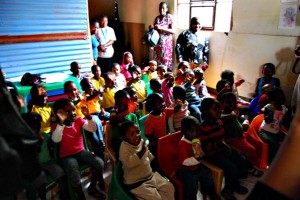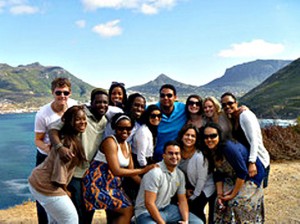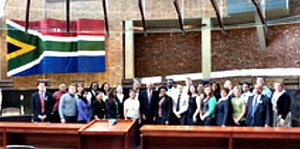
The John Marshall Law School students visited children at a child care center in Soweto. Photo by Molly Schmiege
Michelle Miller expected to be educated, fascinated, and engaged when she made plans to travel to South Africa as part of her Comparative Constitutional Law class at The John Marshall Law School. What she didn’t expect was “a life-changing experience” that led to a “paradigm shift regarding my future role as a lawyer.”
“After this trip, I know that I must become an international lawyer who changes lives by becoming an advocate for international economic development, social justice and human rights,” she said.
Miller, an LLM student in the International Business & Trade Law program, was one of 25 students who made the trek to Johannesburg, Cape Town and Pretoria in March 2011.
They were accompanied by Adjunct Professor Danielle Hirsch and Professors Steven Schwinn and Cecil Hunt. Hirsch, a self-described “travel junkie,” spent her first summer of law school working in South Africa for the South African Human Rights Commission where, she says, “I fell in love with the South African constitution, given its progressive and wide-sweeping mandate.”

The class does a little sight-seeing and picture-taking at the Cape of Good Hope. Photo by Kami McClure.
After graduation from law school and a federal clerkship in the United States, Hirsch spent a year clerking for Justice Zak Yacoob at the Constitutional Court of South Africa. Her experiences in South Africa led to her appointment as an adjunct professor at John Marshall, where she co-teaches the comparative constitutional law class. She brought John Marshall students to South Africa for the first time last year. This year was the second trip and she’s certain of the educational benefits of the experiences.
“Much of the course’s classroom learning is aimed at exploring the comparative approaches to due process and equal protection, and the trip expands on this knowledge by visiting with government officials, non-governmental organizations and judicial officers whose work grapples with the same issues,” she said.
The spring break trip included a visit to South Africa’s Parliament, a tour of Robben Island (a prison where both Nelson Mandela and Mahatma Gandhi were jailed), a visit to the Constitutional Court and the Department of Justice and Constitutional Development, among many other visits.
Bookending the more academic experiences were a visit to the Cotlands Orphanage in Johannesburg at the beginning of the trip and, as the tour was winding down, a stop at a children’s care center in the slums of Soweto.
Hirsch said the students were so inspired by the work being done at the orphanage and nursery that they founded a student group, the John Marshall Africa Human Rights Project and host events to raise funds for both organizations. The group just completed a successful series of bake sales during exams to raise money.
Miller said those side trips were the part of the trip that affected her the most. “We saw children from six months to 5 years old packed in a shanty structure that had a dirt floor and looked as if it would collapse if the wind blew too hard.”
During the visit to Soweto, the group entered one area where, according to Hirsch, “Seemingly for blocks and blocks, there are rows and rows of tin shacks, where people live with no running water or electricity.”

Con Court. Students meet with Justice Zak Yacoob of the Constitutional Court of South Africa. Photo by Steve Ulrich.
The trip left a lasting impression, as well, on third-year student Dionte Durham. “I had always seen on television how bad it was in Africa, and I’d read things, but to experience it with my own eyes was totally different,” he said. “It became life-changing for me when I got back and noticed how much I take for granted things like running water, lights, or even socks and shoes.”
But there were also some more touristy experiences on the agenda as well, including a cable-car ride to the top of Table Mountain in Cape Town, a drive to the Cape of Good Hope with a visit to a penguin colony, and a safari. “The compact agenda of the trip was a perfect balance between fun tourist activities, cultural engagement, and academic and intellectual stimulation,” said third-year student Jessica Youngblood.
For Hirsch, one of the highlights of the trip was a meeting with Advocate George Bizos, a distinguished human rights advocate who vigorously campaigned against apartheid in South Africa, most notably by representing Nelson Mandela and Walter Sisulu during the Rivonia Trial, which led to their imprisonment at Robben Island, and Steve Biko’s family for their legal challenge against their son’s unlawful detention that resulted in his death. Advocate Bizos is now the director of the Legal Resources Centre, a public interest impact litigation law firm in South Africa, and he spoke with the John Marshall class about his life, work and the importance of “doing good.”
The class also met with Commissioner Leon Wessels, former commissioner from the South African Human Rights Commission and deputy chairperson of the Constitutional Assembly; Justice Zak Yacoob of the Constitutional Court of South Africa; members of the Office of the Public Protector; members of the South African Human Rights Commission and faculty and international LLM students from the University of Pretoria’s Human Rights Centre.
